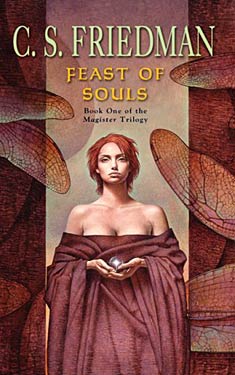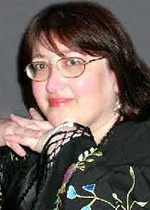WoGF Review: Feast of Souls by C. S. Friedman
 For Lynn Williams (lynnsbooks) books are much more than a hobby or a pastime they’re really an obsession. If she’s not reading a book, she’s talking about books on her blog, Lynn’s Book Blog, or deciding which books to buy next. Lynn reads all sorts of books, sometimes straying into YA, but her first love is fantasy. Recently she started to cross into science fiction thanks to the suggestions of some very excellent bloggers.
For Lynn Williams (lynnsbooks) books are much more than a hobby or a pastime they’re really an obsession. If she’s not reading a book, she’s talking about books on her blog, Lynn’s Book Blog, or deciding which books to buy next. Lynn reads all sorts of books, sometimes straying into YA, but her first love is fantasy. Recently she started to cross into science fiction thanks to the suggestions of some very excellent bloggers.
 Feast of Souls is the first in a dark fantasy series of books called The Magister Trilogy and written by Celia S. Friedman. This is my first reading of any novel written by CSF and as such I am submitting it for my Worlds Without End, Women of Genre Fiction Reading Challenge.
Feast of Souls is the first in a dark fantasy series of books called The Magister Trilogy and written by Celia S. Friedman. This is my first reading of any novel written by CSF and as such I am submitting it for my Worlds Without End, Women of Genre Fiction Reading Challenge.
I really enjoyed this story I must admit. I liked the author’s style of writing and whilst the story isn’t particularly hugely out of character with other fantasy stories or totally unique it was compelling and the author, for me, had a captivating style.
The story basically consists of a strong willed woman, determined against all odds to succeed where others have failed. A man, a prince, dying from a terrible wasting disease, who goes on a quest in search of answers and in between both of these we have a strange and dark force that is about to be unleashed upon the world, a mad, blood thirsty king who will go to any length to conquer and his queen – a gentle woman born of a race of people granted innate powers to protect the world in it’s greatest need.
At the start of the novel we are given a short introduction to a witch who is dying at a fairly young age. From this we learn that in order to weave magic a witch must use up her own soul’s power and in doing so she uses up this source more swiftly than the average person and thus die prematurely. The world created by Friedman contains a lot of magic, some of it borne by witches and the remainder by sorcerers or magisters as they are called here. The difference between the two is the source which fuels their magic and the lengths they are willing to go in order to become powerful or successful. I thought the whole concept here was really quite intriguing whilst being also somewhat horrible at the same time. We have the females who find themselves in control of great power but can only use this at the expense of their own life. They therefore learn to become very careful with how they use that power and usually reserve it for curing life threatening illness. We then have the magisters who seem to have a never ending supply of power which comes at no cost to themselves therefore small wonder that they don’t mind undertaking the most uncalled for magic – such as simply altering their appearance for the sake of vanity. The magisters are proud and cold and very rarely work together but as the full extent of the evil that is about to be released is revealed that is something that is about to change. Man, witch and magister will have to work together if they are to survive.
What I really enjoyed about this book was the world building. It certainly isn’t a fast paced book so if you’re expecting dramatic battles and suchlike then you best look elsewhere. The author enjoys creating a world full of political machinations and manoeuvring by some of the inhabitants in order to gain power. There are multiple points of view used in order to gain a fuller understanding, an approach that I usually enjoy and think is difficult to accomplish and on top of that the author adopts a few different methods in order to bring us up to speed with past history, such as flashbacks and even old fashioned story telling. None of which feel like they bog down the story or lose the main thread.
There are a number of different characters to become familiar with. Kamala is a young witch with great ambition and determination. Her childhood years are a thing of brutality that have shaped her character. She has a wall built around her that can’t be penetrated. Basically she’s a flawed character. She’s no hero of the tale. She wants to live in a man’s world and she isn’t afraid to make difficult choices in order to do so. We know that she will do what she needs to in order to survive and this is why she is able to become a magister – the first female ever to do so in fact. Prince Andovan is almost the opposite. In spite of his privileged upbringing he has a sympathetic character and regardless of his own infirmity tries to help others. I suppose you could say it’s a bit of an obvious role reversal that’s been employed here but I thought it was a good idea. It’s not after all as though all men are exactly the same and neither is it the case for women so having a sympathetic male character and a selfish and flawed female character isn’t unbelievable and I like the way the author has used this for the story. The other most notable characters are Colivar and Ramirus. I haven’t totally made up my mind about these two yet as although the magisters seem to be a cold and haughty type Ramirus shows a certain dedication to the King and his family and Colivar also seems to be taking a fairly active part in thwarting the threat that has been newly discovered – although this could obviously just be self serving. There are plenty of other characters but I won’t elaborate further.
 I thought the author also did an excellent job with the ending. Don’t get me wrong, she’s not afraid to kill off characters and being a bit of a softie I usually prefer the people I’m reading about to stay alive but I liked the way that the ending doesn’t conform to what you want or, more to the point, expect. I admit that all the way through I was trying to second guess how the author would manage to achieve the ending I wanted against the ending that I thought was inevitable and against all expectations she didn’t even try. At the back of my mind I knew what the ending should be, I was desperately struggling to come up with creative ways for the author to not have that ending and yet, at the end of the day, the end was how it should be in order to maintain integrity. I like the way she stuck to her guns and didn’t come up with some exception to the rule to bends things.
I thought the author also did an excellent job with the ending. Don’t get me wrong, she’s not afraid to kill off characters and being a bit of a softie I usually prefer the people I’m reading about to stay alive but I liked the way that the ending doesn’t conform to what you want or, more to the point, expect. I admit that all the way through I was trying to second guess how the author would manage to achieve the ending I wanted against the ending that I thought was inevitable and against all expectations she didn’t even try. At the back of my mind I knew what the ending should be, I was desperately struggling to come up with creative ways for the author to not have that ending and yet, at the end of the day, the end was how it should be in order to maintain integrity. I like the way she stuck to her guns and didn’t come up with some exception to the rule to bends things.
In terms of criticisms. I think the characters need more developing and the reason I say this is I’m not sure, even at this point, how I feel about them. Also, I couldn’t help comparing certain elements of the story to George R. R. Martin but given the setting and story type that’s probably inevitable. I also couldn’t help wondering about the magisters and why, if they’re so powerful, they even bother with the subterfuge of working for others? Although I think this is all part of their secretive and mysterious nature and working for others lends them a certain sort of normalcy in order that they’re not too closely scrutinized. I also couldn’t help but question why they couldn’t switch their sources – I’m trying not to give away spoilers here so you’ll have to bear with me!
On the whole I thought this was a very enjoyable novel and I can’t wait to read the next in the series.
Next month’s new author for me will be Teresa Frohock – Miserere.



















 Full Details
Full Details


No comments yet.
Sorry, the comment form is closed at this time.